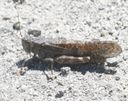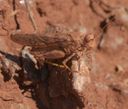Circotettix
Circotettix
Classification
- Phylum: Arthropoda
- Subphylum: Hexapoda
- Class: Insecta
- Order: Orthoptera
- Suborder: Caelifera
- Family: Acrididae
- Subfamily: Oedipodinae
- Tribe: Trimerotropini
- Genus: Circotettix
Pronunciation
How to pronounce Circotettix: /ˌsɜːrkoʊˈtɛtɪks/
These audio files are automatically generated. While they are not always 100% accurate, they are a good starting point.
Images






Summary
Circotettix is a genus of band-winged grasshoppers in the family Acrididae, comprising about 9 described species, known for their loud buzzing sounds and certain wing characteristics.
Physical Characteristics
Most species have very wide tegmina that do not narrow noticeably or may even widen toward the end. The hind wings are exceptionally wide, with an undulate outer margin and a somewhat elongated apex into a short lobe. C. maculatus has blackish wings and produces a buzzing crepitation.
Identification Tips
Distinguished from Trimerotropis by the shape of wings and strongly thickened annal veins of hind wings. C. maculatus is recognizable by its buzzing crepitation and distinctive coloration.
Habitat
Exposed rocky or eroded areas, usually sloping, and often steeply sloping.
Distribution
Primarily in western North America, specifically in the United States, with some occurrence in southern western Canada and possibly northernmost Mexico.
Diet
Herbivorous; typical diet includes various grasses and herbaceous plants.
Life Cycle
All species overwinter as eggs, with adults most common in summer into autumn.
Reproduction
Reproduction details are not extensively documented, but generally involve oviposition in soil or plant material.
Ecosystem Role
Acts as a herbivore in its ecosystem, potentially influencing plant community dynamics and serving as prey for various predators.
Collecting Methods
- Netting
- Hand collection
Preservation Methods
- Drying
- Pinning
- Freezing
Evolution
Circotettix is closely related to Trimerotropis; taxonomic revisions may transfer some species from Trimerotropis to Circotettix based on future cytological and molecular studies.
Similar Taxa
Misconceptions
C. maculatus is often misidentified based on similar wing traits but is distinguished by its sound and coloration.
Tags
- grasshopper
- Circotettix
- Acrididae
- North America
- band-winged